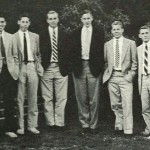Paul Fussell, author of the mordantly hilarious “Class: A Guide Through The American Status System,” died Wednesday at the age of 88.
“Class” includes an entire chapter devoted to the semiotics of dress, and he aims his wry wit at his own class as much as those above and below. Here’s an excerpt:
Upper-middle clothes… lean to the soft, textured, wooly, nubby. Ultimately, the difference implies a difference between city and country, or labor and leisure, where country betokens not decrepit dairy farms and bad schools but estates and horse-leisure. Thus the popularity among the upper-middle class (and the would-be upper-middle class, like members of Ivy university faculties) of the tweed jacket. Country leisure is what it implies, not daily wage slavery in the city.
The tweed jacket is indispensable to the upper-middle-class trick of layering. A man signals that he’s classy if, outdoors, he comes on in a tweed jacket, with vest or sweater (or two), shirt, tie, long wool scarf, and overcoat or raincoat. An analogy is with the upper-class house, which has lots of different rooms for different purposes. Wearing one shirt over another — Oxford-cloth button-down over a turtleneck, for example — is upper-middle-class, and the shirt worn underneath can ever be a dress shirt (solid color is best) with its own collar, a usage I’ve seen in warm weather on Madison Avenue in the upper eighties.
RIP, Professor Fussell, you were a sharp critic and delightful entertainer. — CHRISTIAN CHENSVOLD











What Prof. Fussell had to say about the prole jacket gap in his book Class (1983):
“Here, the collar of the jacket separates itself from the collar of the shirt and backs off and up an inch or so: the effect is that of a man coming apart. That this caste mark is without specifically reactionary political meaning is confirmed by a photograph of Richard Hoggart, the British radical critic and Labor Party enthusiast, used to promote a recent book of his: his jacket is gaping a full inch at the rear, ample indication that jacket gape afflicts the far left as well as the far right. What it betrays, indeed, is less the zealot than the stooge. Like the poor chap interviewed on TV recently by William F. Buckley. He was from Texas and wanted to censor school textbooks to repress, among other evils, pro-miss-kitty. (As gently as possible, Buckley corrected this mispronunciation of promiscuity so that the audience would know what the poor ass was talking about.) But even if the Texan had not, with complete confidence in his unaided powers, delivered repeatedly this prole mispronunciation, his perceptiveness and sensibility could have been inferred from the way his jacket collar gaped open a full two inches. Buckley’s collar, of course, clung tightly to his neck and shoulders, turn and bow and bob as he might. And here I will reject all accusations that I am favoring the rich over the poor. The distinction I’m pointing too is not one between the tailored clothes of the fortunate and the store clothes of the others, for if you try you can get a perfectly fitting suit collar off the rack, or at least have it altered to fit snugly. The difference is in recognizing it as a class signal and not recognizing it as such. You’ve got to know that, as Douglas Sutherland says in An English Gentleman, almost the most important criterion in a suit worth wearing at all is ‘that it should fit well around the shoulders.'”
Class is an entertaining, if highly-confused, book. In the passage above Fussell conflates regional origin with class status, in a particularly uninformed way. Thus, William F. Buckley was likely “gentle” with “the Texan” because Buckley’s father was from Texas, and a first-generation American at that.
Taliesen
First, no academic is ever going to miss an opportunity to punk a book censurer, WFB gives him cover, although the clothing examples are apt.
Second, many regardless of region, income or education suffer from bad fitting jackets. Good taste, attention to detail and having “class” is taught and learned.
Shades of blue, navy, and gray Prince of Wales tweed, OCBD, an what looks to be a wool challis. Plus the gold tank. Hells to the yes.
Paul Fussell was from Pasadena, California, the same as Julia Child and General Patton.
Roy
All three had class as defined by Fussell, you get extra points from CC, Patton was an accomplished swordsman.
@ Roy C. Platt. And we Pasadenans are grateful to count Prof. Fussell as one of our sons. Endlessly amusing in “Class”: “Both Florida (except perhaps for Palm Beach) and Southern California (except perhaps for Pasadena) have been considered socially disastrous for decades.” Really brilliant in “The Great War and Modern Memory.” His life arrested the dumbing of America; his death hastens it.
Paul Fussell had a great sense of humor, and I think that was operative in Class, just as it was in Lisa Birnbach’s, The Official Preppy Handbook. That isn’t to say that his observations weren’t culturally accurate. He was not only a fine literature professor, but also an astute ethnographer.
I recently included two blog posts, quoting passages from Class:
Your Tie Reveals Your Social Class
http://thriftstorepreppy.wordpress.com/2012/04/23/class-meaning-of-ties/
Class: A Guide Through the American Status System
http://thriftstorepreppy.wordpress.com/2012/04/17/avoid-prole-jacket-gape/
Paul Fussell’s wit will be missed!
http://www.slate.com/articles/arts/the_dilettante/2012/05/paul_fussell_remembering_the_author_of_the_great_war_and_modern_memory.single.html
OCBD
Thanks for the link. Interestingly, both right and left have high praise for Paul Fussell in their obits, which is a testament to his scholarship and integrity.
Paul Fussell’s work influenced a generation of Chinese (20-30 years old who can read English and care about US social structure), very sad to see he is gone.
Sadly this means there will be no update to Class. I would have liked to see what he had to say about the present. While that book was not mean to be a scholarly work, it was a fun read and his observations tended to be accurate. However, there were two of his observations that have always seemed so wrong to me. First was his positioning of the “fat capital of the U.S.A. … located somewhere in the triangle of Minnesota, Iowa, and the Dakotas.” Everything I have read, even over twenty years ago, indicated that this “fat capital” was in the Louisiana and Mississippi area. The second issue was with vodka being one the top class drinks; gin would be more accurate. Gin has the anglophile connection and a pronounced taste. No matter what you mix gin with you will still know that gin is in the mix, whereas vodka’s big attribute is that is that it lacks any taste and therefore will not offend anyone – so middle class.
I have yet to own a tweed jacket for the record, Ivy fans, but if I do have the honor of purchasing one, I will look no further than J. Press. Shirt with it’s own collar? I guess he means it’s not a button down oxford shirt, popularizied by Brooksbrothers, Paul Stuart, and Polo by Ralph Lauren, just to name a few. Eric L, I think you need to go from some of the Gins, to some of the Scotchs. What’s your favorite Scotch flavor like, Mr. Middle class?, and how did you enjoy this snarky tart book, please give your review.
Farewell Mr. Fussell, may your soul rest in heavenly peace. “Even a child is known by his doings, whether his work be pure, and whether it be right”.